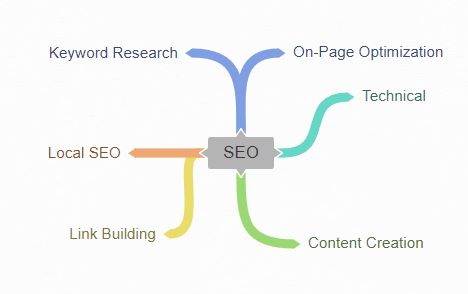Search Engine Optimization (SEO)
- Introduction to SEO
- Keyword Research
- On-Page Optimization
- Technical
- Content Creation
- Link Building
- Local SEO
In today’s digital landscape, search engine optimization (SEO) has become an integral part of any successful digital marketing strategy. As businesses compete for online visibility, it’s essential to optimize your website and content to ensure that they are easily discoverable by search engines and potential customers.
At Dogdish Technologies we understand the importance of SEO in driving organic traffic and increasing brand awareness. Our Offering Digital Marketing SEO service is designed to help businesses of all sizes optimize their online presence, improve their search engine rankings, and achieve their digital marketing goals.

Our team of experienced SEO experts uses proven strategies and techniques to help your business succeed online. From technical optimization to content creation and link building, we provide a comprehensive range of SEO services to meet your unique needs.
Whether you’re looking to increase your website traffic, improve your search engine rankings, or boost your online visibility, our Offering Digital Marketing SEO service can help you achieve your goals. With our expertise and commitment to delivering results, you can trust that your digital marketing efforts are in good hands.
Overview & Business Importance
Search engine optimization (SEO) is a fundamental aspect of digital marketing that involves optimizing a website’s content, structure, and code to rank higher in search engine results pages (SERPs). In today’s digital age, search engines like Google and Bing have become the go-to source for information and services, making SEO a critical aspect of any business’s online presence.
With millions of websites on the internet, it can be challenging to stand out from the competition. SEO helps businesses increase their online visibility by ensuring their website ranks higher in search engine results. This, in turn, helps businesses drive more traffic to their website, generate leads, and increase sales.
Moreover, SEO is a cost-effective marketing strategy that provides long-term benefits. Unlike paid advertising, SEO helps businesses generate organic traffic that can continue to generate leads and sales even after the initial investment in optimization has been made. SEO also provides valuable insights into consumer behavior, allowing businesses to create more targeted marketing campaigns and improve their overall digital marketing strategy.
In today’s highly competitive digital landscape, businesses that do not invest in SEO risk being left behind. With more and more consumers turning to search engines to find information and services, SEO has become an essential aspect of any successful digital marketing strategy.
Brief History & Evolution
Search Engine Optimization (SEO) has come a long way since its early beginnings in the mid-1990s. Back then, the internet was in its infancy, and search engines were few and far between. Early search engines like Archie, Gopher, and Yahoo! relied on manual submission and categorization of web pages, with little emphasis on relevance or user intent.
It wasn’t until the late 1990s and early 2000s that search engines like Google and Bing emerged and began to dominate the search landscape. With the rise of these new search engines came new challenges for businesses and website owners looking to rank well in search results.
In the early days of SEO, keyword stuffing, hidden text, and other manipulative tactics were commonplace. However, as search engines became more sophisticated, these tactics became less effective, and search engines began to focus on factors like relevance, authority, and user experience.
Today, SEO is a critical component of any digital marketing strategy. With billions of searches conducted each day, businesses that can effectively optimize their online presence for search engines stand to gain a significant advantage over their competition. However, with search algorithms constantly evolving, SEO is an ongoing process that requires constant attention and adaptation.
It’s important to note that while the history of SEO is interesting and informative, the focus of this guide will be on current best practices and strategies for SEO in today’s digital landscape.
Role in Digital Marketing
Search engine optimization (SEO) plays a critical role in digital marketing, as it helps businesses improve their online visibility and attract more organic traffic to their website. Organic traffic is valuable because it is free and sustainable, unlike paid traffic that requires ongoing investment. SEO involves optimizing a website and its content to rank higher in search engine results pages (SERPs) for relevant keywords and phrases.
One important aspect of SEO is understanding the user intent behind each search query. By understanding what users are searching for and why, businesses can create content that addresses those needs and provides value to their audience. This not only helps improve rankings but also fosters a positive user experience, which can lead to higher engagement and conversion rates.
Another key aspect of SEO is link building. Search engines use links to assess the authority and relevance of a website. Building high-quality, relevant backlinks from other authoritative websites can help improve a website’s rankings and visibility. However, it’s important to note that link building should be approached with caution, as spammy or manipulative link building practices can result in penalties from search engines.
One important advantage of SEO over other digital marketing tactics is its long-term sustainability. While paid advertising campaigns may provide quick results, they require ongoing investment to maintain. SEO, on the other hand, can provide sustainable traffic and visibility for years to come, provided that best practices are followed and updates are made to keep up with changes in search algorithms.
Finally, it’s worth noting that the role of AI and machine learning in SEO is growing. Search engines are becoming increasingly sophisticated in their ability to understand user intent and deliver relevant results, and businesses that leverage AI-powered SEO tools and techniques are likely to have an advantage in the competitive online landscape. However, it’s important to balance the use of AI with human expertise and creativity to ensure that SEO efforts are effective and ethical.

